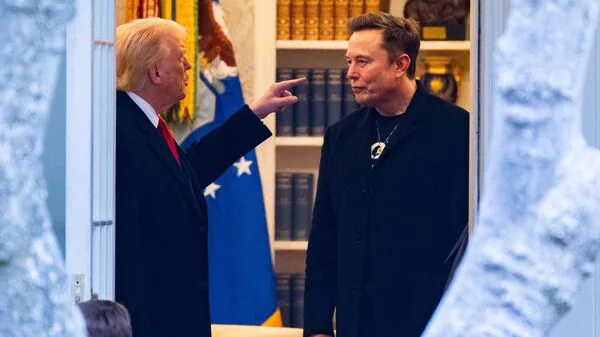NEW YORK, JUNE 7, 2025 — In an extraordinary display of how personal clashes can trigger financial tremors, a public spat between U.S. President Donald Trump and Tesla CEO Elon Musk sent Tesla shares into a tailspin and rippled across global equity markets.
Tesla stock plunged as much as 19.6% intraday on Friday before recovering slightly to close down 13%, erasing nearly $110 billion in market capitalization. The Nasdaq Composite fell 2.4%, while the S&P 500 dropped 1.8%—their worst single-day performance in months. Analysts have dubbed it the “Trump–Musk Shock.”
How It Began
The confrontation began when President Trump criticized Musk during a press conference for “unfairly benefiting from federal subsidies” while “sending U.S. manufacturing jobs abroad.” In a rare political move, Trump announced the termination of a multi-billion-dollar federal EV infrastructure contract that Tesla had secured earlier this year.
Musk responded within hours on X (formerly Twitter), accusing Trump of “economic sabotage” and suggesting the administration was “hostile to innovation.” He added, “No one individual—not even the President—should weaponize policy for personal politics.”
This tweetstorm, paired with Tesla’s heavy reliance on federal programs and tax incentives, spooked investors and ignited a broader selloff across the EV and clean energy sector.
Wider Market Fallout
Tesla’s dip dragged down related stocks including Rivian (-6.2%), Lucid Motors (-7.8%), and major lithium suppliers like Albemarle (-5.4%). Even traditional automakers with EV exposure such as Ford and GM saw sharp declines. The VanEck Future Mobility ETF dropped 4.9% in a single session.
Wall Street strategists described the situation as “political risk priced in real time.” “It’s rare that personal dynamics between a CEO and the President shake markets like this,” said Dana Reynolds, chief equity strategist at Bernstein. “Investors are reacting not just to lost revenue, but the unpredictability this signals for corporate America.”
White House Doubles Down
Far from backpedaling, the White House released a follow-up statement alleging that Tesla had violated terms of its infrastructure contract by sourcing key components from non-allied nations, including China and Vietnam.
While no formal investigation has been launched, legal analysts suggest the administration could leverage the Defense Production Act to impose further restrictions on Tesla’s operations.
Political analysts believe Trump’s strategy may be aimed at rallying blue-collar and protectionist voters ahead of the 2026 midterms, but warn that this approach risks alienating Silicon Valley and Wall Street simultaneously.
What’s at Stake for Tesla
Tesla’s long-term federal partnerships are now in question, especially its access to Department of Energy grants, tax credits for gigafactory expansions, and EV rebate eligibility. The company has yet to formally comment beyond Musk’s social media outbursts, but insiders suggest legal counsel is reviewing options.
Investors are also scrutinizing Tesla’s China strategy, where it recently doubled down on gigafactory investments. If U.S.–China tensions worsen further, Tesla’s exposure there could turn from asset to liability.
Looking Ahead
The episode highlights a dangerous new precedent: corporate valuations directly impacted by high-profile political confrontations. With Trump signaling that more “accountability for corporate greed” is coming, investors may have to recalibrate how they assess political risk.
For now, Tesla’s stock remains volatile, and the world is watching whether cooler heads—or hotter tweets—prevail next.

